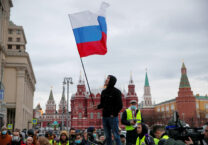Iran’s Foreign Ministry has reiterated its apparent commitment to a peaceful nuclear program, while emphasizing that the state would prepare with whatever it takes to defend itself against Israel.
“The official stance of Iran in rejecting weapons of mass destruction and regarding the peaceful nature of the Islamic Republic of Iran’s nuclear program is clear. As emphasized in the recent speech by the Supreme Leader of the Islamic Revolution, we will equip ourselves to the extent necessary for the defense of Iran," said Foreign Ministry spokesperson Esmail Baghaei.
For weeks, Iranian officials have ramped up their narrative that Tehran possesses the capability to produce nuclear weapons, asserting that only Khamenei's so-called religious fatwa prevents it from doing so.
Baghaei also claimed that the country will use all its "material and spiritual resources to respond to the recent aggressions by the Zionist regime."
This statement comes as Iran’s leadership intensifies its stance amid escalating tensions with the United States and Israel.
Khamenei has called on officials to make every necessary preparation to defend the country against the US and Israel.
"We are fully committed to preparing the Iranian nation in every necessary way to confront arrogance," Khamenei said on Saturday.
He added that both military readiness and political efforts are integral to this approach.
On October 1, Iran launched more than 180 ballistic missiles in two waves, targeting sites within Israel. The attack was presented as a response to the recent assassinations of several key figures allied with Iran, including Hamas leader Ismail Haniyeh in Tehran, and Hezbollah leader Hassan Nasrallah. While Israel reported intercepting most of the missiles, the strikes have led to further deterioration in already fraught relations between the two arch enemies.
Israel’s October 26 retaliation included airstrikes on Iranian missile facilities and air defense systems, resulting in the deaths of four Iranian soldiers and one civilian, according to Iranian sources. While Iran has not disclosed details of potential further responses, its leadership has said it will give a harsh response.
Experts have noted that Iran's strategic defense capabilities have been severely compromised by Israel, casting doubt on the credibility of Khamenei’s promised responses.
In response to the attacks between Israel and Iran, the country has experienced further economic turmoil, with the US dollar now trading at 710,000 rials—the steepest decline in the value of the national currency to date.
 Iran's President Masoud Pezeshkian
Iran's President Masoud PezeshkianOn Monday, Iran’s President Masoud Pezeshkian drawn attention to the economic pressures facing the nation, framing the situation as an economic war rather than a purely military one.
Pezeshkian warned that economic hardships could pose a more significant threat to Iran than external military aggression, suggesting that economic resilience is now a primary focus of his administration.
“Today, we are facing an all-out economic war. What can bring us to our knees are economic problems, and our enemies are pursuing this goal, but we must not be defeated,” he said.
According to Pezeshkian, Iran’s missile capabilities are to deter aggression rather than provoke it. He explained that these weapons serve as a warning, ensuring that no nation could launch an attack on Iran without facing serious consequences.
"We developed missiles so that, like Gaza, Israel cannot bomb anywhere, anyone, at any time it wishes," Pezeshkian added.
On October 7 last year, Iran-backed Hamas launched a large-scale attack on Israeli border areas, killing hundreds of civilians and taking scores hostage. Israel responded with extensive airstrikes targeting Gaza.
This led to a rapid escalation in military activity, resulting in heavy bombardment across Gaza's densely populated areas. The ensuing conflict has devastated infrastructure, caused significant civilian casualties, and created a severe humanitarian crisis.

 2 weeks ago
37
2 weeks ago
37


